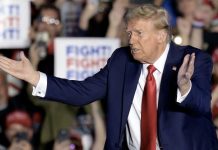
May 8 (UPI) — Two top officials of former President Barack Obama‘s administration appeared in the U.S. Senate Monday to testify about the relationship between the Russian government and President Donald Trump‘s campaign last year.
Sally Yates, the U.S. Justice Department’s short-term acting chief after the new administration took office, was called before a Senate subcommittee to talk about communications between the Kremlin and Trump’s dispatched national security adviser, Michael T. Flynn.
Of particular concern for the Senate Judiciary Committee’s Crime and Terrorism subcommittee was what Yates knew about Flynn’s discussions with Russian ambassador Sergei Kislyak late last year, and what information she passed on to Trump’s White House.
“The efforts by a foreign adversary to interfere and undermine our democratic processes and those of our allies pose a serious threat to all Americans,” Yates said at the hearing, noting that she could not divulge complete information because some of it is classified.
“My answer to that question would require me to reveal classified information, and so I can’t answer that,” Yates told subcommittee chairman Sen. Lindsey Graham, R-S.C., when asked if she has evidence of collusion between Trump’s campaign and the Kremlin last year.
“I’d like to make clear that just because I say I can’t answer it, you should not draw from that an assumption that that means the answer is yes,” Yates said.
Former national intelligence director James Clapper also appeared at Monday’s hearing.
“Understandably, concerns about the egregious Russian interference in our election process is so critically serious as to merit focus — hopefully bipartisan focus — by Congress and the American people,” he testified.
Clapper reminded the panel that the U.S. intelligence community firmly believes the Kremlin made multiple major efforts to sway the vote in Trump’s favor. American intelligence compiled a report late last year saying Moscow was involved in efforts to hack U.S. Democratic websites, and that it’s likely Russian President Vladimir Putin either ordered the interference or at least gave tacit approval for it.
“I’m here today to offer whatever information I can, now as a private citizen, on how the intelligence community conducted its analysis,” he added.
Republicans in Congress have joined Democrats on the issue, because they say it’s an unprecedented attack on American democracy. Graham said it’s a bipartisan issue.
“It could be our campaigns next,” he said. “When one party is attacked, all of us should feel an attack.”
Yates had warned Trump’s administration that Flynn had not told the entire truth about his discussions with Kislyak during his confirmation hearing, and that his appointment as national security adviser could bring political backlash — which it ultimately did.
The White House confirmed Monday that Barack Obama — who fired Flynn as defense intelligence director in 2014, reportedly due to his “chaotic management style” — also warned Trump against appointing him as national security adviser.
“It’s true that President Obama made it known that he wasn’t exactly a fan of Gen. Flynn’s,” Trump spokesman Sean Spicer said at his news briefing Monday.
Yates, who served as acting U.S. attorney general for 10 days under Trump during his transition, was fired for refusing to defend in federal court the president’s “travel ban” against refugees and immigrants — an executive order that has twice been shot down by federal judges.
Russia’s electoral interference is the subject of three major U.S. investigations — one in the House, one in the Senate and one in the Justice Department. Monday’s testimony by Yates and Clapper went into the public record as answers to senators’ questions about what administration officials knew about ties between Trump’s team and Russia, when they knew it and how they communicated it to the new administration.
“I had two in-person meetings and one phone call with the White House counsel (Don McGahn) about Mr. Flynn,” Yates said of a conversation six days after Trump was inaugurated. “I told him that I had a very sensitive matter that I needed to discuss with him, that I couldn’t talk about it on the phone and that I needed to come see him.
“[I] began our meeting telling him that there had been press [stories] of statements from [Vice President Mike Pence] and others that related conduct that Mr. Flynn had been involved in, that we knew not to be the truth. … [I] also told the White House counsel that Gen. Flynn had been interviewed by the FBI on Feb. 24.”
Yates said she and a Justice Department associate expressed concern to McGahn about Flynn’s talks with Kislyak.
“The underlying conduct that Gen. Flynn had engaged in was problematic,” Yates recalled telling McGahn. “We told him we felt like the vice president and others were entitled to know that the information they were conveying to the American people wasn’t true.”
Some news reports said Flynn had discussed the possibility of Trump’s administration lifting certain sanctions against Moscow that were imposed by Obama to punish the Kremlin’s election interference. Trump fired Flynn on Feb. 13 because, according to the president, he had lost trust in the general — particularly for failing to disclose the Kislyak talks to Pence when he was asked about it.
“We weren’t the only ones that knew all of this. The Russians also knew,” Yates said. “The Russians also knew that Gen. Flynn had misled.”
Trump has repeatedly denied any connection or collusion between his campaign and the Russian government.
The congressional investigations into the matter are ongoing, as is the Justice Department’s inquiry.





